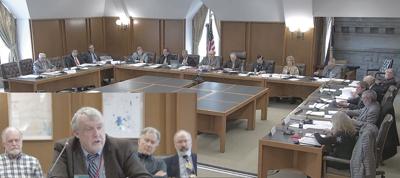CONCORD — The majority of those testifying on HB 208 before the House Committee on Science, Technology, and Energy on Monday supported the bill, which calls for updating the state’s climate action policy to include reductions in greenhouse gas emissions.
Wharton Sinkler of Sandwich told the committee that addressing climate change is not only important for health and the nation’s economic future but also for national security.
“Right now, we are indirectly in a conflict with Russia, and they benefit when we use a lot of fossil fuel and therefore keep the global price for fossil fuels high," Sinkler said. "So from a national security point of view, New Hampshire can do its part and really have an impact if we plan away from these fossil fuels. It will benefit the climate, it will benefit health, it will benefit national security.”
Ken Wells of Andover, a former state legislator, spoke of the economic benefits for a state that depends upon tourism.
“The current 10-year plan is a plan that maintains the fossil fuel status quo,” Wells said, “and this accelerates the deleterious economic effects in the portion of the state that’s the economic engine for tourism and forestry — the part of the state that we are all from.”
Committee Chair Michael Vose (R-Epping) challenged Wells’ assertion that, in 60 years, New Hampshire’s climate will be like North Carolina’s climate is today.
“Well, that’s a prediction,” Vose said, “but most of the predictions that have been made about climate change in the last 30-40 years have proved to be incorrect.”
“I don’t believe that,” Wells responded.
Michael Fitzgerald, the assistant director of the Department of Environmental Services’ Air Resources Division, said DES is not taking a position on the bill, which has merits but lacks any appropriation to hire the additional personnel necessary to develop the plan.
Fitzgerald noted that, when the state developed its current climate action plan in 2009, the governor appointed a 29-member task force to oversee its development, using money received through a national air pollution settlement with power plants in the Midwest. That process took two years to complete, and Fitzgerald said that, in order to develop a well-thought-out update of the plan, it would likely take another two years. The department would need three additional staff members to undertake the update, including one permanent position to provide the annual updates required under the proposed legislation.
HB 208 states that the climate action plan would seek at least a 20% reduction of greenhouse gas emissions by 2025, based on 1990 levels. It aims at a 50% reduction by 2035 and achievement of “net zero” by 2050.
In her testimony, Meredith Hatfield of the Nature Conservancy addressed some representatives’ doubts about achieving those goals by noting that, through the Regional Greenhouse Gas Initiative and other policies, the state already has come a long way in reducing emissions from the 1990 levels.
“I do think, if the committee is not comfortable moving forward with this bill as currently drafted, I would urge you to retain it and work on it more if you feel like it needs more work,” Hatfield said. “I think there would be a lot of people who would be happy to contribute to that process.”
The bill also addresses the recently updated state energy policy, rescinding it and replacing it with the stipulation that it "meet the energy needs of the citizens and businesses of the state at the lowest reasonable cost while providing for the reliability and diversity of energy sources,” that it “maximize the use of all cost-effective energy efficiency and other demand-side resources,” that it “achieve the greenhouse gas emission goals identified in RSA 125-O:31, II,” and that it “protect the safety and health of the citizens, the physical environment of the state, and the supply of natural resources for future generations.”
Joan Widmer of Amherst cited her background as a health care practitioner and her 25-year career in corporate finance in speaking to the importance of addressing the health implications of climate change as well as of updating strategic plans every three years.
“We’re dealing with a climate change plan that had not been updated since 2009,” she said. “That’s untenable because every plan needs to be modified over time because the events and circumstances around those plans change.”
She noted that high temperatures exacerbate health problems such as chronic obstructive respiratory disease and congestive heart failure, but “most of New Hampshire homes are not equipped with air conditioning, and so these patients suffer particularly badly.”
Joseph Kwasnik of the NH Network for Environment, Energy and Climate supported the bill because the state’s current climate strategy lacks specific goals.
“This bill provides actionable and quantifiable goals by specifying greenhouse gas emissions reductions over the next 27 years, including net zero greenhouse gas emissions by 2050,” Kwasnik said. “This bill also requires the New Hampshire Department of Environmental Services to develop a plan to achieve the emissions reductions. This plan should provide the blueprint so sorely needed in New Hampshire to begin to deal with the climate change challenge.”
Those signing the “blue sheet” in lieu of verbal testimony supported the bill, 3-1, and online support was 166-12.


















(2) comments
While a healthy natural environment is a laudable goal to speak of, I have to wonder how many advocates of this proposed legislation were vocally and physically opposed to the Northern Pass electric project? Would all these supporters actively endorse new nuclear plants in New Hampshire to replace and upgrade that source from our current supply? Science tells us that, in the last 200,000 years, the World’s oceans have been 27 feet higher and 400 feet lower than they are today, and that did not occur due to human industrialization. Build Northern Pass or it’s equivalent; design and build nuclear power plants; and stop damning fossil fuels, and there will be legitimacy to all the verbiage being thrown about on helping civilization get cleaner. Shouldn’t take a committee and years to figure that out.
The testimonies from the members of the public were all excellent. The comment about climate projections by Representative Vose, Chair of the NH House Science, Technology, and Energy committee, concerning.
His assertion is unsupported by the data. Studies show past predictions from major scientific studies (e.g. USGCRP, IPCC, NOAA, NASA, and EPA) have proven accurate or overly conservative:
1) Scientific American: Climate Science Predictions Prove Too Conservative
Checking 20 years' worth of projections shows that the Intergovernmental Panel on Climate Change has consistently underestimated the pace and impacts of global warming: https://www.scientificamerican.com/article/climate-science-predictions-prove-too-conservative/
2) Figure 5: Hansen et al. (1981): http://www.skepticalscience.com/lessons-from-past-predictions-hansen-1981.html
3) Evaluating the Performance of Past Climate Model Projections: https://agupubs.onlinelibrary.wiley.com/doi/full/10.1029/2019GL085378
4) How good have climate models been at truly predicting the future: https://www.realclimate.org/index.php/archives/2019/12/how-good-have-climate-models-been-at-truly-predicting-the-future/
5) How do climate models work: https://www.carbonbrief.org/qa-how-do-climate-models-work?s=09
6) Even Exxon's own climate projections from decades ago matched those of the major scientific organizations and have proven accurate:
"Over the past several years a clear scientific consensus has emerged," [Roger Cohen, head of theoretical sciences at Exxon Corporate Research Laboratories] wrote in September 1982, reporting on Exxon's own analysis of climate models. It was that a doubling of the carbon dioxide blanket in the atmosphere would produce average global warming of 3 degrees Celsius, plus or minus 1.5 degrees C (equal to 5 degrees Fahrenheit plus or minus 1.7 degrees F).
"There is unanimous agreement in the scientific community that a temperature increase of this magnitude would bring about significant changes in the earth's climate," he wrote, "including rainfall distribution and alterations in the biosphere."
https://insideclimatenews.org/news/15092015/Exxons-own-research-confirmed-fossil-fuels-role-in-global-warming
Why are some citizens and elected leaders in New Hampshire confused about the confidence, accuracy, and consensus of science about human-caused global warming? Over 100 organizations and front groups have been created and funded by fossil fuel industry interests (e.g. Koch - https://drexel.edu/news/archive/2013/december/climate-change) to confuse the public and elected leaders about what we know through science about human-caused global warming to delay addressing climate pollution from fossil fuels. Many of them disguise themselves as "Conservative Think Tanks". While a large portion of their advocacy is for fundamental Conservative values, they take a major detour on the topic of climate change and climate pollution from fossil fuels - they are the leading sources of disinformation about climate science. It seems to be a trojan horse approach to get states like New Hampshire to protect their profits over our own self-interests.
We need our elected leaders, especially all the Representatives in the House Science, Technology, and Energy Committee, to have a sound understanding of climate science from the experts rather than getting their opinions from the ideologically motivated and polluting industry-funded front groups that have worked (successfully) for four decades to delay addressing the climate pollution from fossil fuels.
The House STE should hold a special climate science, economics, and policy discovery session for all the members of the committee. They could invite state climate experts to give a brief summary of what we know based on the scientific consensus and the economic consensus. For example, someone from NH DES, the New Hampshire state climatologist (Dr. Mary Stampone of UNH), the lead author of the state's previous Climate Assessment Report (Dr. Cameran Wake of UNH), and public policy experts on climate policy such as Dr. Charles Wheelan of the Rockefeller School of Public Policy at Dartmouth College (http://clcouncil.org/economists-statement).
Federal carbon pricing is Inevitable. Our state should prepare for it, not ignore it and the scientifically-identified problem it is designed to help solve: https://www.greenenergytimes.org/2022/12/carbon-pricing-is-inevitable/
Welcome to the discussion.
Log In
Keep it Clean. Please avoid obscene, vulgar, lewd, racist or sexually-oriented language.
PLEASE TURN OFF YOUR CAPS LOCK.
Don't Threaten. Threats of harming another person will not be tolerated.
Be Truthful. Don't knowingly lie about anyone or anything.
Be Nice. No racism, sexism or any sort of -ism that is degrading to another person.
Be Proactive. Use the 'Report' link on each comment to let us know of abusive posts.
Share with Us. We'd love to hear eyewitness accounts, the history behind an article.